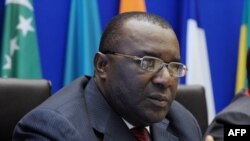A meeting of central African finance ministers and officials of the Bank of Central African States, BEAC, has predicted very difficult times for economies of the six central African nations if they do not diversify their economies.
BEAC governor Lucas Abaga Nchama says falling world petroleum prices, insecurity from Boko Haram terrorism and the spillover of the crisis in the Central African Republic (CAR), has led to growing debts and weak financial performances of the private sector in Chad, Cameroon, CAR, Equatorial Guinea, Gabon and the Republic of Congo.
He says economic growth has been reduced from about 4 percent before 2014, to 2.8 percent in 2015 and 1.6 percent so far in 2016. He says the overall fiscal deficit has worsened from 4.1 percent of GDP to over 6 percent and that all central African countries have experienced unprecedented increases in their debt levels and are afraid the debts may get to 70 percent of GDP, a level they consider very bad for any economy.
Lucas says the drop in petroleum prices from $105 a barrel in August, 2015 to about $60 a barrel in March, 2016 has had negative effects on the economies of Equatorial Guinea, Chad and Gabon, which rely principally on petroleum products to develop their economies.
The governor says it is now imperative to drastically reduce ambitious development plans and invest wisely in projects that will improve the living conditions of grassroots populations.
Remi Yakoro, who represented CAR at the meeting, says they have urged central African states to investigate the sources of arms circulating in the region and assistance given terrorist groups to destabilize their countries.
He says terrorism funding, funding of rebel groups and illicit money transfers should be stopped because these are factors that will continue to destabilize central African states, and by extension, neighboring economic blocks.
Chad's minister in charge of finance, Mahamat Allamine Bourma Treye, says it is imperative for central African states to promote regional integration and preserve their monetary union as one of the main conditions to achieve growth. He says central African states should promote regional integration, the free movement of people and goods, and work together in finding solutions to their common problems.
He says unity is strength.
At the end of the meeting, the finance ministers agreed to diversify their economies away from petroleum resources only, and to invest in agriculture and enact reforms that will promote stronger growth and reduce inequalities.
The region has agriculture potential, but less than 12 percent of farmland in the six countries is used for agriculture.




